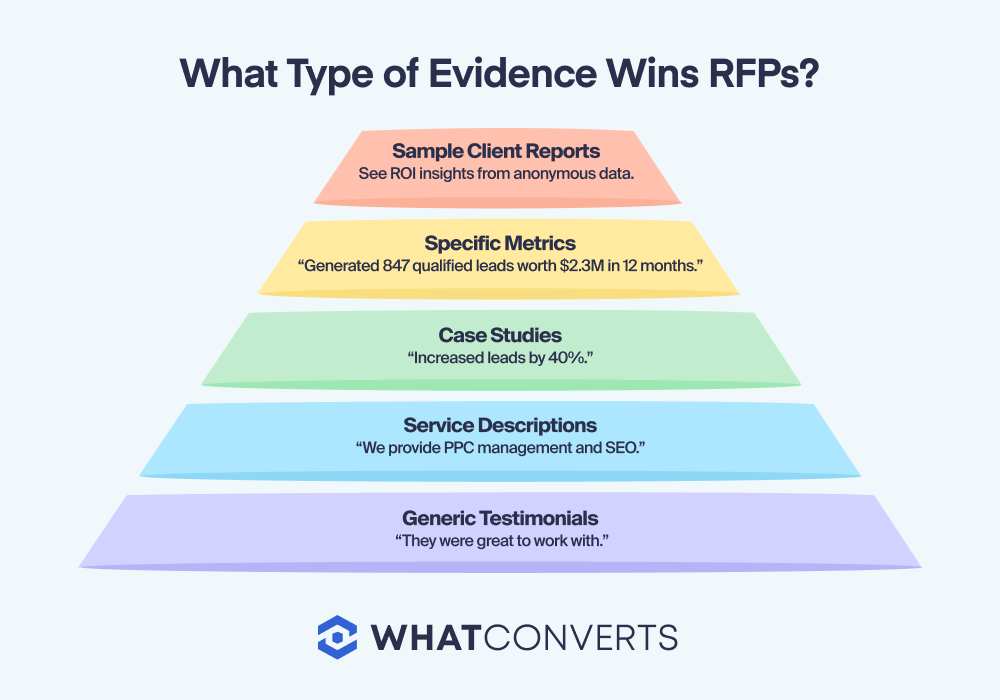
You just spent hours on an RFP response to a potential client you think has a lot of potential. Unfortunately, yours is just one in a stack of similar proposals, all promising “innovative solutions” and “proven expertise,” claiming they’ll “exceed expectations” and “drive results.”
These vague promises mean nothing to a potential client. They want to see concrete assurances measured using the metrics they care about—but without access to their current performance data, you can't confidently promise specific improvements like "we'll reduce your cost per lead from $150 to $90" or "we'll improve your conversion rate from 2.3% to 4.1%."
The agencies that consistently win competitive RFPs lead with comprehensive proof of their measurement capabilities and historical results rather than relying on promises about future performance. When you can demonstrate exactly how you've tracked, analyzed, and optimized marketing performance for other clients, prospects gain confidence in your ability to deliver measurable results for them too.
How to Stand Out in the Modern RFP Landscape
Just like a student needs to study the rubric before they start on a project, you need to understand how clients evaluate RFP responses if you want to craft a winning bid of your own.
The Psychology Behind RFP Processes
Business owners are fundamentally risk-averse. They're not just evaluating capabilities—they're assessing potential downsides. A vendor who can demonstrate consistent, measurable results reduces perceived risk more effectively than one who simply promises great outcomes.
That means agencies with comprehensive tracking systems have a significant advantage over those who can’t quantify their results. When you can show exactly how previous campaigns generated qualified leads, improved conversion rates, and delivered measurable ROI, you're providing the concrete evidence that vendor managers crave.
Overlooked Decision Factors
Most agencies focus heavily on credentials and processes instead of real results. They describe what they do rather than what they achieve. This approach treats all prospects as identical rather than addressing specific business challenges.
Decision-makers need more from a proposal in order to confidently sign a contract. They look at things like risk mitigation approaches and evidence of accountability. Agencies that position comprehensive measurement and transparent reporting as core differentiators address these unspoken concerns effectively.
The most successful RFP responses demonstrate not just what you've done, but exactly how you measured success and optimized for better results over time.
Qualifying RFP Opportunities Before You Respond
One of the smartest things you can do when drafting an RFP response is to walk away from a potential client that you know is a poor fit. It might seem counterintuitive to turn down potential business, but bidding for contracts that don’t set you up for success only takes time and attention away from the clients that have the potential to become real and lucrative partners.
Create a Go/No-Go Framework
It’s not just about evaluating clients based on fit with your expertise, timeline expectations, and budget alignment. It’s also about whether you have compelling case studies and performance data that’s relevant to their industry or situation. Even if it’s a great fit, if you can’t put together a compelling proposal, you’re wasting valuable time.
Historical client data reveals patterns about which types of prospects become successful long-term relationships. When you can track lead quality, lifetime value, and campaign performance across different client segments, you can more accurately assess whether a new opportunity aligns with your sweet spot.
Develop Pre-RFP Relationships
The best RFP responses are actually won before they’re even submitted. Building relationships with potential clients allows you to get a better understanding of their unstated needs and to position your capabilities as solutions that address the specific challenges they’re facing.
That doesn’t mean you need to become every potential client’s best friend before you can draft a proposal, but investing real energy in your pre-proposal meetings can go a long way toward providing a fuller picture of their needs.
Structure Your RFP Response for Maximum Impact
How you structure your RFP response will determine how well your proposal showcases your abilities and convinces your prospective client that you’re the team for the job.
Showcase Quantifiable Results in Your Summary
Start with a compelling summary of measurable results you’ve delivered for similar clients. As best you can, try to match your examples to your prospect not just in terms of industry, but in terms of size and similarity of goals, too.
Instead of, “We’re a full-service digital marketing agency with 15 years of experience,” try, “We helped three mid-sized HVAC companies increase qualified leads by an average of 147% while reducing cost per acquisition by 32%.”
Read More: Better > More: Agency Segments Leads by Type, Grows Volume 220%
Use Visual Design to Display Dense Information
It’s only natural to want to pack as much valuable information as possible into your RFP response, but after a certain point, adding data nets diminishing returns as your reader’s eyes glaze over and they begin to skim over the main points.
Translate your key information into digestible graphics and use them to break up big walls of text throughout your proposal. Keep your reader’s time and energy in mind—your proposal should be a light read, not a dense research report.
Emphasize Outcomes over Features
The difference between winning and losing RFPs often comes down to how well you communicate value instead of just capabilities.
Translate Capabilities into Benefits
Instead of describing your call tracking features, explain how comprehensive lead attribution helped a client discover that their highest-value customers came from unexpected marketing channels, leading to a 40% improvement in budget allocation efficiency. By employing this "show, don't tell" approach, you can help potential clients better visualize the successful outcomes they can achieve by partnering with your team.
Showcase Specific, Measurable Results
Vague testimonials like, "They increased our leads significantly" carry little weight compared to concrete data: "Generated 1,247 qualified leads worth $3.2 million in potential revenue over 18 months." The specificity demonstrates both capability and accountability.
When you can present client results with detailed lead tracking data—showing exact lead volumes, quality improvements, and ROI increases—you're providing proof rather than promises.
Address Unstated Needs
When working with outside contractors, many clients worry about accountability and transparency. By demonstrating your commitment to concrete measurement and reporting processes using leads instead of vanity metrics, you can proactively address these concerns, even if they weren’t explicitly mentioned in the RFP requirements.
Price for Value, Not Lowest Bid
Winning RFPs isn't about submitting the lowest price—it's about demonstrating superior value that justifies your investment.
Justify Premium Pricing
When you can show concrete ROI projections based on actual client results, premium pricing becomes an investment discussion rather than a cost comparison. Historical lead tracking data provides the foundation for credible ROI forecasts. It doesn't matter how much your work costs if it makes your clients even more money in the end.
Offer Options and Tiers
Present multiple service levels that allow prospects to choose their comfort level while establishing your comprehensive capabilities. Position basic packages alongside enhanced offerings that include advanced measurement and optimization features. By offering "entry-level" contract options, you can convince more skeptical clients to work with your agency long enough to prove that you can deliver on your promises.
Address Price Sensitivity
When prospects focus heavily on cost, redirect the conversation to value creation. Show how superior measurement and optimization capabilities typically improve performance enough to more than offset higher fees through better results.
The most effective pricing presentations connect investment levels directly to expected outcomes based on proven performance data.
Read More: 42% More Patients with Value-Driven PPC Strategy [Case Study]
Make Measurement Your Differentiator
In a competitive RFP environment, comprehensive measurement capabilities can be your strongest differentiator.
Positioning Comprehensive Tracking
Most agencies mention "detailed reporting" without explaining what that really means. Instead, describe the specific insights that comprehensive lead tracking provides: individual customer journey analysis, channel attribution accuracy, and optimization opportunities that standard analytics miss. Most importantly, highlight your ability to prove exactly which qualified leads your campaigns were responsible for.
Creating Confidence Through Transparency
Offer prospects visibility into your measurement methodology and sample reports from similar clients. This transparency demonstrates confidence in your capabilities and addresses concerns about marketing accountability. There's no need to compromise your other clients' privacy to make examples of your successful work for them; simply blur sensitive data to produce "safe" versions of your client reports to share.
Unified Tracking Advantages
Explain how tracking all lead types—calls, forms, chats, and offline conversions—in one platform provides clearer ROI demonstration than piecing together data from multiple sources. This unified view enables more accurate attribution and better optimization decisions. Explain how tracking different platforms' conversions separately results in leads being counted two, three, or even four or more times each, artificially inflating the value of each platform's content and campaigns. By stitching all of that data together and organizing it into individual lead profiles, you eliminate these duplications and can present the cold, hard data behind exactly how valuable your campaigns are.
Individual Lead Journey Tracking
Highlight your ability to track complete customer journeys from first touchpoint through final conversion. This capability allows for sophisticated analysis that reveals which marketing activities truly drive valuable outcomes. Discuss your ability to measure using different attribution models and how these approaches can better inform the client's marketing strategies by backing them with concrete data.
Setting Optimization Expectations
Describe how continuous measurement enables ongoing campaign improvement. Show examples of how tracking insights led to significant performance improvements for previous clients.
Again, use a "show, don't tell" model to back all of your success claims. Explain exactly how tracking individual leads allows you to use enhanced conversions to train Google Ads's bidding algorithm to only target the keywords that are bringing in real customers.
Position measurement not as a nice-to-have reporting feature, but as a strategic capability that drives superior results through data-driven optimization.
Winning RFPs with Measurement-Based Proposals
Winning RFPs requires more than just meeting requirements—it demands demonstrating measurable value that sets you apart from competitors who make similar promises.
The agencies that consistently win competitive RFPs share one common advantage: they can prove their value with concrete data rather than rely on promises and credentials. This requires having robust measurement capabilities in place before you need them for RFP responses.
By leading with specific, measurable results and positioning comprehensive tracking as a key differentiator, you transform RFP responses from tedious compliance exercises into strategic opportunities to showcase your unique value proposition. When prospects can see exactly how you'll measure and optimize their marketing performance, choosing you becomes the obvious decision.
Ready to win more RFPs with data-driven proof of results? Start your free 14-day trial of WhatConverts and build the measurement foundation that sets you apart.
Get a FREE presentation of WhatConverts
One of our marketing experts will give you a full presentation of how WhatConverts can help you grow your business.
Schedule a Demo
Grow your business with WhatConverts






